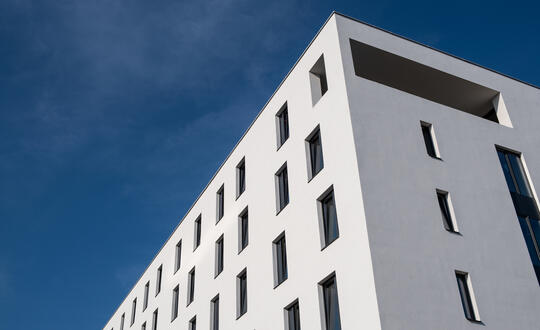
Modern Methods of Construction (MMC) has seen a huge increase in interest and investment over the last few years.
There are a number of reasons for this, ranging from the Government's mandate that a minimum of 25% of affordable homes must be delivered using MMC, the pressures of both labour and skills shortages forcing the industry to rethink how it allocates its resources most effectively, the lessons from the pandemic where the industry has realised it can do things differently, the unmet high demand for housing, and the impetus around net zero.
On 2 March 2022, we asked industry leaders at our virtual panel discussion to share their thoughts on the progress that has been made over the past five years and what challenges MMC needs to overcome to become the 'new normal' for the construction industry.
Ian Atkinson, Partner in Womble Bond Dickinson's Construction and Engineering Team, chaired the event, and was joined by:
- Joseph Worland, Associate Director, Lloyds Banking Group
- Stephen Wightman, Regional Director - UK MMC Lead, Faithful + Gould
- Jessie Wilde, Deputy Project Director, Bristol Housing Festival
- Edward Jezeph, Senior Investments Manager, Homes England
- Pablo Martinez Rodriguez, Senior Lecturer, Department of Mechanical and Construction Engineering, Northumbria University.
The event centred around three main areas:
- the effect of the lack of technical standards on the wider adoption of MMC.
- the position of insurers and lenders in providing cover and financing to MMC suppliers and owners of MMC-built homes.
- the role in MMC in bringing real change from an ESG and sustainability perspective.
The key points from the event are summarised below, along with the full webinar recording.
Technical standards are the key to MMC adoption
While there is interest in adopting MMC, there remains a lack of technical standards for example around the size and quality of MMC components, and how MMC products are graded and assessed.
The panel considered whether a lack of technical standards is a barrier to the increased adoption of MMC and in doing so talked about the NHBC Accepts and BSI standards (the latter of which are a work in progress); a new standard that has been published in Canada; the risk of suppressing innovation through over-prescription in standards; who should write or be involved in writing these standards; the importance of focusing on performance criteria; and how the UK housebuilding market differs to that overseas.
Insurers and lenders and their role in MMC
Insurers and lenders have been getting more comfortable with MMC over the last few years. We are already seeing successful collaboration e.g. through the Buildoffsite Property Assurance Scheme (BOPAS) (developed alongside the RICS, Lloyd's Register and BLP Insurance) and this has given lenders more confidence in the quality, durability, and the mortgageability of MMC homes. However, more can be done in this area.
Next, the panel looked at what they thought could help mitigate any continuing concerns that brokers and financiers may have around MMC. This included discussing the different situations in the markets for lending to homeowners as opposed to lending to commercial developers; the importance of the NHBC and BOPAS warranties; issues around the credit ratings/balance sheets of MMC providers and how the market is maturing; the need drive better industry understanding of the MMC process including around repairing defects; how standardisation can provide reassurance through substitutes then being available; the potential for MMC to drive a different model for housing delivery; and the speed of housebuilding with a possible new market around renting.
MMC, ESG and sustainability
Environmental, Social and Governance or ESG is a hot topic for businesses across the board at the moment.
However, for construction it is particularly pertinent as the industry is reported to contribute to "50% of all natural resource extraction worldwide…23% of air pollution, 50% of climatic change, 40% of water pollution, and 50% of landfill wastes…36% of global energy use and within the UK alone is accountable for 47% of carbon dioxide emissions", which is clearly not sustainable.
In light of this, our experts considered how MMC can herald real change in this area.
Our experts spoke about the benefits of MMC around improving diversity and inclusion; reducing transport emissions and embodied carbon in buildings; delivering better safety outcomes; increasing sustainability. They also talked about the use of robotics and automation; greater opportunities for digital technologies; social value; improvements in the quality of homes; and opportunities for customisation using MMC.
For more on MMC download our MMC: a fit for the future report or visit our re:build hub.
This article is for general information only and reflects the position at the date of publication. It does not constitute legal advice.





